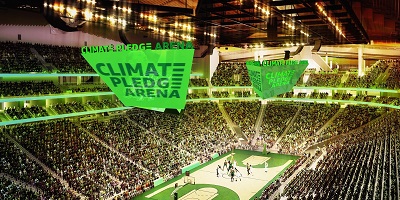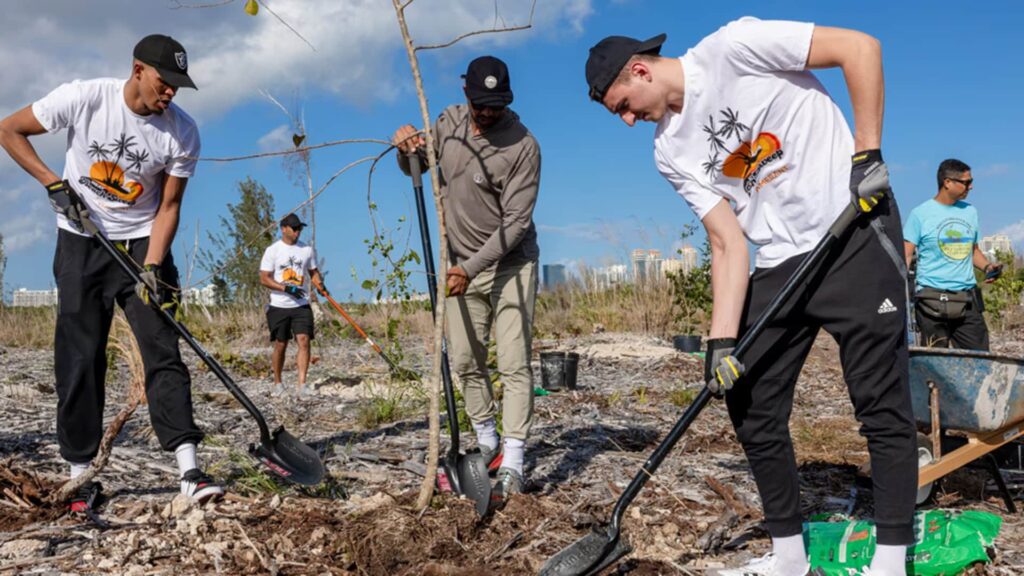
As we mark this past Earth Month and Earth Day and continue to prioritize sustainability year-round, learn about some of the fresh new ways NBA arenas are working to make our game and world more sustainable.
Atlanta Hawks: Since May 2021, State Farm Arena has diverted at least 90% of fan-created waste, keeping it out of landfills. In 2023, the venue saved over 3 million pounds of potential trash and containers through reductions, reuse, recycling and composting.
“Accomplishing this was only possible with an entire team effort,” said Geoffrey Stiles, Hawks’ senior vice president of facilities and events for State Farm Arena, as the team and venue celebrated achieving TRUE Platinum Certification in 2022.
“When we began our zero waste journey, we knew that the vision would take buy-in from everybody — our fans, partners and staff — night after night and event after event to make this happen. We are incredibly grateful to share this monumental achievement with them.”
Cleveland Cavaliers: Over the years, Cleveland Cavaliers’ Rocket Mortgage FieldHouse has nearly doubled how much waste it diverts from landfills.
In 2023, Rocket Mortgage FieldHouse diverted 77,762 pounds of food waste for compost, which will be turned into soil to be used in the community.

Indiana Pacers: By initiating the “Fieldhouse of the Future” renovation in 2020, Pacers Sports & Entertainment has committed to prioritizing environmental sustainability.
During the renovation project, approximately 2,928 tons of all materials — roughly 80 percent of what was used — were recycled, including all of the old seats.
In addition, PS&E further cut electricity consumption by upgrading or replacing mechanical, electrical and plumbing systems with energy-efficient alternatives.
Among other efforts, officials have also shredded and recycled nearly 14,000 pounds of paper since the start of 2016, which is the equivalent of 122 trees saved.
LA Clippers: As they construct the Intuit Dome (which will be the team’s new home starting in 2024-25), the Clippers are targeting the highest environmental standards, with a long-term goal of making the arena carbon neutral.
The venue will be fully electric and feature solar panels that feed a battery energy storage system with a capacity of 11.5MWh, allowing Intuit Dome to sustain itself off the Los Angeles electric grid for an entire NBA game.
The arena will also feature a zero-waste sorting room, reclaimed water deployment and over 300 EV charging stations.
New Orleans Pelicans: The New Orleans Pelicans’ Smoothie King Center strives to be a vital part of the community through ongoing sustainability efforts.
Working with Sodexo Live, the arena’s food and beverage provider, all leftover food from games and events is donated to Second Harvest and Bethel Colony food banks.
After the Pelicans discontinue them from use, the arena’s specialty basketball courts are installed at local schools, universities and other venues.
Smoothie King Center also serves as a staging and support venue in the city’s hurricane response plan, as the institution provides leadership in the community in the face of imminent weather and climate change.
New York Knicks: There are tens of thousands of bees on the roof of Madison Square Garden — it’s a good deal for all.
The Knicks’ Madison Square Garden partnered with The Best Bees Company to combat the declining bee population in New York City and beyond by installing two hives at the arena.
Each hive is home to a queen bee and approximately 40,000 worker bees who produce honey.
According to the New York Office of the State Comptroller, about one-third of the food eaten by Americans comes from crops pollinated by honey bees, including more than 130 types of apples, melons, cranberries, pumpkins, squash, broccoli and almonds, to name just a few.
According to the U.S. Department of Agriculture, honey bees pollinate $15 billion worth of crops in the United States each year.
“Honey bees are essential to the agricultural industry for the pollination services they provide,” officials said.
Portland Trail Blazers:
The Portland Trail Blazers and the Moda Center broke new ground this season, as they partnered with Bold Reuse, a local, women-owned business, to launch the first full-venue reuse program in American professional sports.
Since the start of the season, The Rip City Reuse program has erased the potential waste of more than 320,000 single-use cups, equating to over 15,000 pounds of discarded goods.
Utah Jazz: The Delta Center has taken significant steps to improve its impact on the Earth in recent years, starting with a 2017 renovation.

By replacing all lighting with LED fixtures, the arena also cut power usage by 75 percent, and officials installed more than 6,000 solar panels as well.
Staffers have also expanded the Center’s recycling and composting efforts, leading to more than 300,000 pounds of additional cardboard being recycled each year.
Learn more about the sustainability achievements of all 30 NBA arenas here. Earth Day was first held in 1970, prompted by growing societal awareness of the importance of the environment following Rachel Carson’s bestseller, Silent Spring.
U.S. Sen. Gaylord Nelson, D-Wisconsin, was recognized with the Presidential Medal Of Freedom in 1995 for leading the creation of the holiday.
Source: NBA.com




